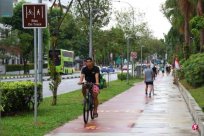The 40 years of world events have changed. Today, Singapore has changed the era (in fact, and three prime ministers have been changed). All policies have to be reviewed and reviewed; the language policy is the same.The dialect ban can be considered open, directed by the folk independently, and the results are negative.
Looking back at the Chinese Movement, which began in 1979, it has been 45 years today. It is a rare long -term language planning campaign and can be called a unique case.What is the effect?
For the past 45 years, four national censuses have been experienced.We can speak with data.
From the perspective of census statistics, the Chinese family, mainly dialects, from 76.2%in 1980 to 11.8%in 2020.It seems that the downward trend will continue, and the fate of dialects will be difficult to reverse by the fate of marginalization.In the past 40 years, the ratio of Chinese and English has increased significantly.Families with English as the main term increased from 10.2%to 47.6%; Chinese families increased from 13.1%to 40.2%.English and Chinese alternative dialects have become the common language of Chinese.Looking back at the goal of speaking Chinese movements at that time, it can be said that "more Chinese" has been reached, and "less dialects" have also been reached.However, the warning of the founding of the founding Prime Minister Li Guangyao at the opening: "If we continue to use dialects, English will become the common language of the Chinese." Now we do n’t use dialects, and English will still become the common language of the Chinese!
Not using dialect English still becomes a common language of Chinese
Between the first generation, the transformation of social language is Chinese and Chinese in Chinese; the speed of transformation has never been seen before.Chinese replacement of dialects is converted from elite language to popular language. The dialect is comprehensive and marginalized. Of course, for Lee Kuan Yew.
Similarly, is the whole people speak English, is it the goal of Singapore's language policy?At the National Day celebration of 1986, the first time of the Sai Yi was carried out in English. At that time, Lee Kuan Yew specially praised the National Day celebration of that year was great success."Since our efforts in 1959, after 27 years of hard work, the celebration of the ceremonies can finally use English to promote the audience to respond and sing together. 20 years ago, it was everyone sang different songs."Time of jokes" (Lee Kuan Yew's life challenge: Singapore's bilingual road, 2012, 38)
However, promoting Chinese and sacrificing dialects is not at a price.Different languages / dialects are used in a family; the three generations of the same hall did not have the same language, so that the ancestors and grandchildren could not communicate, it was a pity that many Chinese families experienced together.Li Guangyao also acknowledged: "Logically, the decision that should be obvious is obvious; but emotionally, such a choice is painful."
In addition to the private field of the family, the Zongxiang Club, based on geographical / language and fate, is also deeply affected.
The geographical hall is based on the purpose of strengthening the friendship of the fellow villagers and providing the necessary services for the folks.The use of dialect township sounds, originally the foundation of gathered nostalgia, is not an exaggeration to say that it is righteous.However, from the perspective of promoting Chinese, these geographical / fate halls are one of the sources that hinder the popularization of Chinese and the fortress that must be "broken" by Chinese movements.
Although the use rate of dialects has been slightly slightly used for many years, there is still a grassroots vitality in the people. Although it is suppressed by official policies, it has always occupied a world in the field of popular culture.It is more obvious that in local movies, the dialect has a wide scale, such as insufficient money (2002), 881 (2007), and recruits (2013), which are very popular.In addition, dialect pop songs include Cantonese pop songs and Fujian (southern Fujian) songs, which are also popular in the occasions of July Ge Terrace and Karaoke, and have been enduring for many years.
Liang Wenfu's works of the sparrow of the sparrow titled bamboo branches for 23 years were banned for 23 years of use. In August 2013, it was aimed at the ban on the ban."Sparrow" can finally be "bamboo branches". Does this show the opening of dialect space?Is this the first sparrow in spring?
Three years later, in September 2016, the new media opened the "dialect period" at noon on Friday and broadcast the local produced dialect TV series., Mainly in Fujian dialect, supplemented by other dialects, the purpose is to better communicate with the elderly.In 2021, the new media launched a new dialect magazine for a happy family, advocating lifelong learning, encouraging elderly people to maintain a healthy and active life, and bringing rich information and entertainment to the elderly.
From these signs, the language restrictions of official wireless radio and television programs have shown signs of looseness.Although there is no formal announcement of policy changes, it can be said to be tentatively open.After the show was launched, there was no wind and waves, and it seemed to continue.The footsteps of spring are slower, and it is worth waiting.
The new generation starts to become interested in dialects
From the perspective of increasingly active folk activities in recent years, we can feel that the voice and activity of citizen groups can be strengthened.According to Lianhe Zaobao, in recent years, the millennials and generations have also begun to become interested in dialects. Some people even suggested that the Ministry of Education starts dialect elective courses.Discussion and research of college campuses seem to be fashionable.At the same time, the official position seems to have adjusted.This year, the "National Chinese Competition", which was co -organized by the New Newspaper Media Chinese Media Group and Nanyang Women's Middle School, and was supported by the Ministry of Education's promotion of Chinese learning committees., "I hope to contact the multiple elements of Chinese and Chinese diversification in a wider range." It is affirmed that dialects are the characteristics of local languages, which shows the width of the scale, or a leaf knowing autumn, which is worthy of attention.
In recent years, the Zongxiang Club has also held dialect session classes and lectures all year round: such as the Cantonese Class of the Guangdong Association, Fujian Hall Fujian -language course, as well as tide -language and Qiong language courses, Xiamen Guild Fujian -language lectures, etc.It is known that the response is quite enthusiastic.It's just the effect, it is not known.
In fact, from the perspective of the effectiveness of the Chinese movement, in Singapore today, the status of Chinese as a common language between Chinese dialects can be said to have been consolidated.The goal has been achieved, you can rest assured to relax the limit.
For the 40 years since the beginning of the Chinese movement, Singapore society has also experienced significant changes.The first factor that cannot be ignored is the change in the population structure.In the past 40 years, Singapore's population increased from 2.4 million in 1980 to 3 million in 1990, 4 million in 2000, 5 million in 2010, and nearly 6 million today.In the past 40 years, the population has doubled, and the majority of new population is new immigrants, and the majority of the first generation of immigrants from China accounted for the majority.This important new group, the maintenance and promotion of Chinese and Chinese, and the improvement of Chinese cultural resources have made positive contributions.
The change of population structure is not only increased, but also a diversified population.A large number of new immigrants join, making Singapore Chinese society more diverse.Most new immigrants come from China outside Fujian and Guangdong.In terms of language, this further dilutes the status and functions of local dialects.
During these 40 years, Singapore ’s national education level has been greatly improved, citizen consciousness has been strengthened, and public affairs are actively participating in public affairs.Coupled with the popularity of social media, the online world, or the noise of the public, or holding a group in the same temperature, everyone has the opportunity to become an Internet celebrity.
In short, the 40 -year world changes, Singapore has changed its time today (in fact, the three prime ministers have been changed), and all policies have to be reviewed and reviewed; the language policy is the same.The dialect ban can be considered open, directed by the folk independently, and the results are negative.
As for folk activities, is it effective for promoting dialects?Li Guangyao has long said: "We have changed the language environment of Singapore. From multi -dialect to a Chinese environment. The atmosphere of Chinese speaking Chinese in Singapore can no longer be reversed, and Singapore's language environment can no longer go back. If there are still people wantKeep dialects, then please, it is not far from the dialect, because the entire community has spoken ChineseWho else can I tell dialects?"(Lee Kuan Yew, the challenge of my life: Singapore Bilingual Road, 2011, 177)
Where is the Chinese dialect in Singapore?Do you go far?Do you go through?Let the people with hearts try it.At least the way you choose.
The author is a lifelong honorary professor of Nanyang University of Science and Technology



